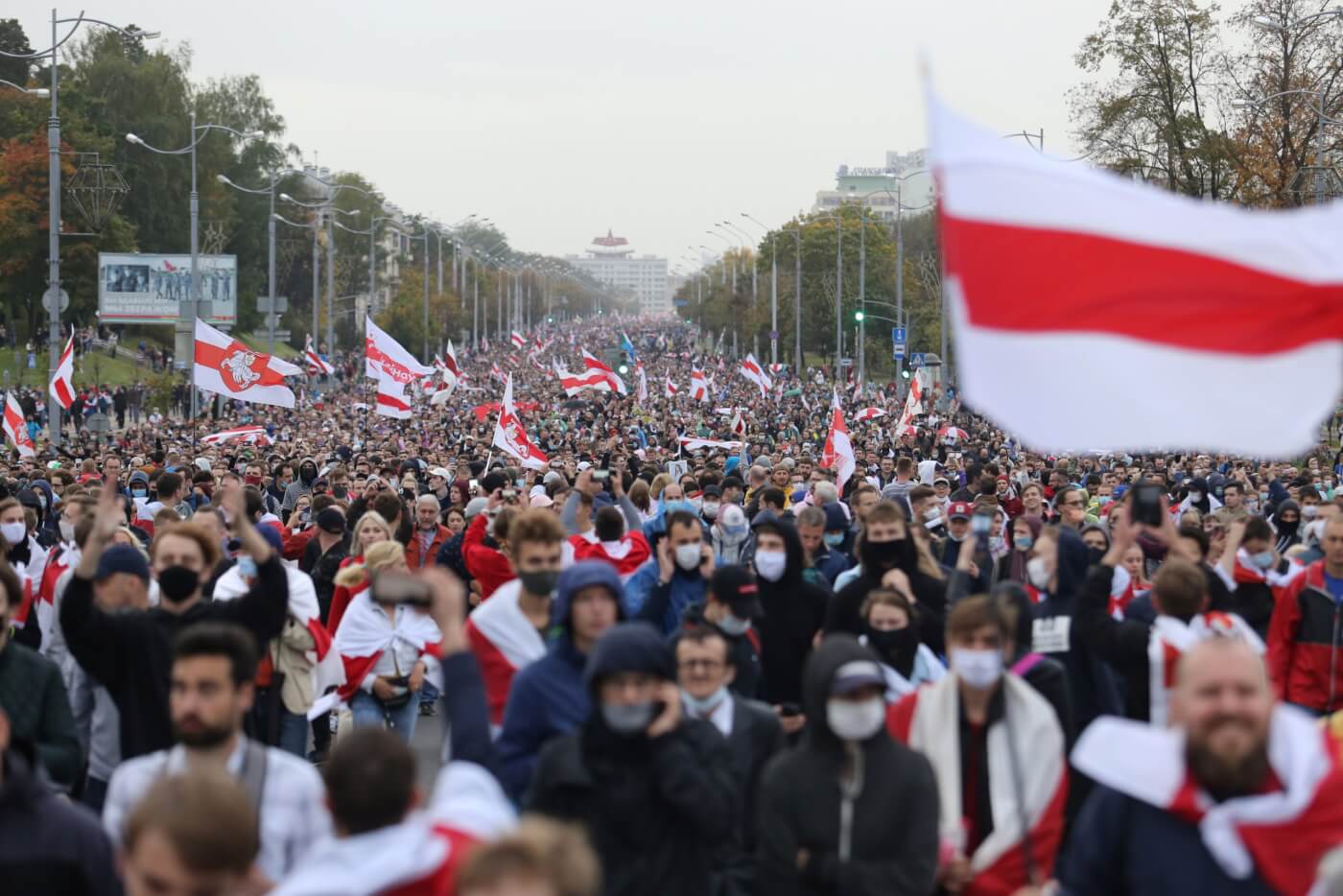Two months have passed since the presidential election in Belarus in which Alexander Lukashenko claimed to have ‘won’ over 80% of the votes, sparking the country’s largest-ever anti-government protests.
Svetlana Tikhanovskaya, who became the main opposition candidate after her husband was barred from running and sent to jail, was forced to go into exile in Lithuania after threats to her life and has now been put on Russia’s wanted list on a “criminal charge”. Although Russia’s interior ministry did not give any details of the charge against her.
Meanwhile, Tikhanovskaya has spoken at the UN Security Council, met with EU foreign ministers, and has visited Berlin to discuss the crisis with Chancellor Angela Merkel and in Minsk and across the county, eight weeks on, hundreds of thousands are still gathering every Sunday in peaceful protest against Lukashenko and in support of Tikhanovskaya.
Last Sunday, over 100,000 protesters gathered in Minsk. Belarus police carried out mass arrests again and attacked protesters with tear gas and rubber bullets.
At least two people have died in clashes with the police and thousands have been detained with numerous reports of severe overcrowding, beatings and torture. Hundreds of journalists have been harassed and arrested. Media outlets, like popular independent Tut.By, have had their licences revoked and foreign journalists have had their accreditations cancelled, making it illegal for journalists working for foreign media to report from Belarus.
The European Parliament and many countries around the world, including the United States, have said they do not recognise Lukashenko as the legitimate leader of Belarus. Instead, global leaders are giving support to the Coordination Council, which was set up by opposition leader Svetlana Tikhanovskaya to facilitate a peaceful transfer of power, as the “interim representative of the people” of Belarus.
Poland and Lithuania, who have been among the loudest to condemn Lukashenko and violence and repression, are now facing demands from Belarusian authorities to withdraw their ambassadors and to significantly reduce their diplomatic representations in Minsk.
In a statement, the EU’s High Representative for Foreign Affairs said:
“Attempts by the Belarusian authorities to target certain EU Member States will not succeed in weakening EU unity.”
On 1 October, all EU Member States called on the Belarusian authorities to end violence and repression, release all detainees and political prisoners, respect media freedom and civil society, and start an inclusive national dialogue.
EU sanctions now target 40 Belarus officials, but not Lukashenko. The UK, however, has imposed landmark sanctions on Lukashenko and his son in addition to senior figures in the Belarusian government.
Foreign Secretary Dominic Raab announced the sanctions in coordination with a similar move from Canada. He said:
“We will hold those responsible for the thuggery deployed against the Belarusian people to account and we will stand up for our values of democracy and human rights.”
Even in cyberspace, Lukashenko’s regime is being put under pressure. Since the start of September, a group of anonymous hackers describing themselves as the “Cyber Partisans of Belarus” have successfully compromised dozens of government IT systems.
Among other things, president Lukashenko and his interior minister found their profiles included on official Belarusian police wanted lists. Online state news broadcasts were interrupted with footage of police violence.
They have also paralysed computing systems at the prosecutor general’s office, stock exchange, Minsk police department, and tax office. They blanked government sites for hours at a time and caused the payments system at the national bank to crash.
Yet Lukashenko refuses to step aside. But with increasing international pressure, sanctions and mass protests, the question is for how long he will be able to.
Perhaps the power to decide lies with the Kremlin in Moscow. Vladimir Putin was one of the first to congratulate Lukashenko on his ‘victory’ and promised to send military assistance should he need it. In the beginning of September the two also held a face-to-face meeting in Moscow. The Kremlin will want to keep Belarusians on their side and stepping in to save Lukashenko will do the complete opposite. At the same time, if Lukashenko is threatened by someone who wants to move Belarus towards Europe, the Kremlin might feel compelled to act.
To mark one month since the election, the International Observatory published a blog about the pressure Belarusians are putting on Lukashenko’s regime.
Belarus one month after the election: “It is the music of a people who will not be slaves again”

